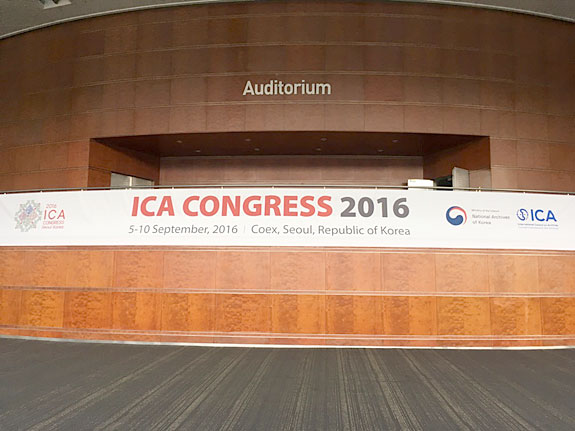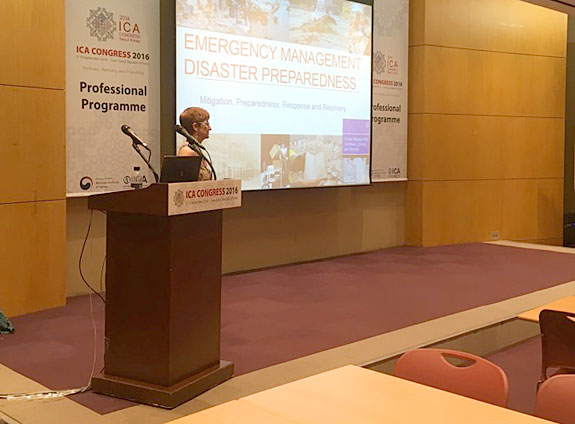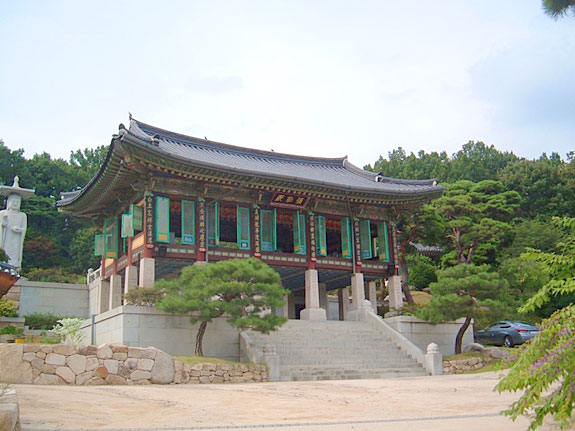ICA Congress Report Seoul, South Korea, Sept. 5-10, 2016

Island Culture Archival Support (ICAS) participated at the recent International Council on Archives (ICA) quadrennial congress in Seoul, South Korea, from September 5-10, 2016. The conference took place at the Coex Convention & Exhibition Center located in Samseong-dong of Gangnam-gu district and is South Korea's largest convention and exhibition centers. The center was immense that boasted a four-story center with four exhibition halls and 48 meeting rooms. The professional program contained eight themes and offered a choice of nearly 100 sessions that produced stimulating papers, informative workshops and dedicated panel sessions with colleagues from around the world. The main subject of the conference was "Archives, Harmony and Friendship" that explored the concept of harmony and cooperation within the archives and recordkeeping field and how archivists reconcile some of the intrinsic conflicts managing archives. Sang Jin Lee, President of the National Archives of Korea, wrote that he envisioned the Congress will be an invaluable opportunity for all participants to experience harmony between tradition and future, with archivists united beyond the continent and into the world. "Humanity makes archives," he said, "and archives make history." The President of ICA, David Fricker, also encouraged archivists and records managers to keep informed and educated. "As part of an active international community, we need to share our ideas with our peers." This was why he felt that the ICA Congress 2016 would be such an essential event of the professional calendar. Indeed, the conference attracted nearly two thousand participants from all around the world./p>
The first day and a half was dedicated to thirteen workshops that participants could choose from including the one that I was involved with titled, Emergency Management and Disaster Preparedness Workshop. As a member of the ICA Expert Group of Emergency Management and Disaster Preparedness, I joined to other members to conduct the all-day event. My co-presenter included Emilie Leumas who is the Director of Archives and Records with the Archdiocese of New Orleans, and Gregor Trinkaus-Randall, a Preservation Specialist for Stony Creek Consulting as well as the Coordinated Statewide Emergency Preparedness of Massachusetts. Together, we endeavored to teach the class of about thirty participants the four elements of disaster management that included: Mitigation, Preparedness, Response and Recovery. We thought that we would try working our way backwards by starting with the topic of "Recovery". Emilie took the floor first and opened the workshop with a frightening slide of a library devastated by a flood. We turned out the lights to add to the affect and had the participants tell us what they saw. Eventually, Emilie would turn this slide into an exercise where participants would work together and decide how they would handle the situation and what kind of supplies they would need to minimize further damage to the collection.
After Emilie, I delivered a training session on Response and Preparedness that weighed heavily on how to develop a written preparedness plan. The participants learned the ten steps on developing an effective plan that included such topics as the introduction, assessing risk and threats, reducing risks, establishing support networks, establishing a recovery team, prioritizing collections, preparing a response plan, preparing a recovery plan, training and reviewing the plan. I provided an exercise to help the participant think about their priority collections and where they are located. It was interesting to see how they struggled to choose their top three collections as the exercise proved a bit more difficult than I expected. Hopefully, they took this exercise back home to work with their own staff as it is very important part of disaster preparedness. Finally, after me, Gregor took to the podium to talk more in depth about Risk Assessment and Mitigation. He provided a Risk Assessment worksheet for the participant to talk over within their groups. Overall, it was a long day, but the workshop went really well and was very well received. In fact, we are hoping we can do something similar at next year's ICA conference in Mexico City.

I attended a workshop that dealt with salvaging water-logged material on Tuesday morning. The workshop's title was "Restoration of Disaster-affected Documents" and was presented by one scholar from the National Institute for Japanese Literature and three professional conservators from the National Archives of Japan. The goal was to guide participants through a hands-on workshop and learn methods of restoring water-damaged documents. The workshop opened with a lecture from Maki Takashina, Project Researcher from the National Institute for Japanese Literature, who talked about the latest natural disasters that have struck Japan and the restoration techniques in restoring documents that were affected by these disasters. After her talk, Tomohiro Akutsu, Chief Conservator of the National Archives of Japan, lead the participants through a hands-on practice on how to restore documents that were damaged by water. The hands-on training was designed so that even those who have little experience in salvaging water-logged material can properly and effectively handle a situation. Hopefully, the participants will never have to salvage water-logged documents. However, we all seemed to enjoy getting our hands wet and learning some valuable techniques. I found that the workshop nicely and appropriately complimented our Disaster Preparedness workshop the day before as restoring documents is a form of the recovery process during disaster management. Our expert group wanted to add a hands-on recovery portion to our workshop but the logistics of shipping supplies to Korea proved to be a bit daunting.
On Tuesday afternoon the Congress kicked off with the Opening Ceremony in the auditorium. After a couple of short, glorifying films about Korea and archivists, a group of Korean musicians took the stage and performed a traditional song with traditional instruments. Perhaps, the highlight of the ceremony came from the speech of the first keynote speaker, John Hocking, who is from Australia and is a senior official of the United Nations. Hocking oversees the preservation and accessibility of the archives of the United Nations' trials arising from the Rwandan genocide of 1994 and the atrocities which engulfed the Balkans in the 1990s. He has recognized the "mission-critical" role of archivists in any institution, and he has ensured their full integration within the operations of the International Criminal Tribunal for the Former Yugoslavia as well as the Mechanism for International Criminal Tribunals. The theme of Hocking's speech was "out of the box and into the world" that made connections between archives initiatives around the world to show the global impact that archives have. He also emphasized the role that archivists make inside and outside the profession. It was truly an inspiring speech that left the audience in awe, and it was a terrific start to a wonderful conference.
For the next two days I spent most of my time attending panel sessions on different archival topics throughout the world. Although there were many sessions to choose from, I tended to be present at talks whose subject matter dealt with the Pacific Islands. As an active member of PARBICA (which is the Pacific Islands branch of ICA), I made sure not to miss any sessions where a PARBICA member was giving a talk. Out of the six PARBICA members attending the conference, three of us had papers to present and one had a poster to share. Thus, one session that I attended included a talk by Fiona Gunn who was from the National Archives of Australia and Opeta Alefaio of the National Archives of Fiji. Unfortunately, Opeta could not make it to the conference, so Fiona gave the speech on his behalf. The title of the paper was "Beyond Ordinary Notions of Effective Development: What International Development Practitioners Can Learn from Archivists and the Archives Community." It was an interesting look at the "twining program" between both of their respective institutions where they shared employees to learn new archival techniques and practices. A second important session that I attended included another paper by Opeta. However, this time the presentation was given by another PARBICA member, Helen Walker of the National Archives of Australia. The paper's title was "My Brothers' Keeper: A Case Study of the Incontrovertible Value of Professional Associations and Long-term Relationships" and was a look at how effective the outreach program at the National Archives of Fiji has been the past year when they share their collections with the community.
Another noteworthy conference event that I attended was a poster session given by Jason Flello of the University of South Pacific (USP). Jason is the manager of the Records Management Department at the University and is also a PARBICA member. His poster was titled "Music to My Ears: You've Got a Friend in Me: Building an Archive with the Support of Friends from across the Waves." The poster described how the University of South Pacific started the process of establishing its own archives and how relationships with in-country collaborators and similar organizations outside of Fiji (which ICAS was one of them) have helped explore the requirements and options of building a USP archives. The poster stated that USP has been fortunate to gain expertise, advice and resources from a wide source of friends who have eagerly shared their knowledge and wisdom, experiences and tools. However, the underlined theme was that there was much more that needs to be accomplished if their goal of starting an archives comes to fruition. They realized that with no professional accreditation process in Fiji as well as no formal archival qualification that staff members can obtain, the USP archives and records management community has to support itself. Thus, the need for friends to collaborate and support this endeavor is absolutely crucial. Finally, the poster made a call to welcome additional support to help them achieve their goal. ICAS plans to continue our relationship and help get this much needed archives off the ground.
On Thursday I was schedule to give a presentation on my paper that was titled, "The Aloha Archives: A Nonprofit Organization's View of Collaboration, Peace and Harmony in Cultural Heritage Organizations of the Pacific Islands." The intent of this paper was to examine archives in the region more closely through the eyes of the non-profit organization, Island Culture Archival Support (ICAS) and the way deference toward peace and harmony affects the attitudes of those in charge of preserving history. Nature plays a big part in this as Pacific Islanders find their love and respect of land imbedded into all aspects of their lives. The region has a rich supply of history, beauty, and sustainability on every level. Hawaiians use the term, "Aloha Spirit," that has a deeper, meaningful interaction and which resonates throughout all of Oceania. Finally, the paper showed how collaboration between regional professionals, local communities, and resources such as ICAS has paved the way for better archival practices and a greater understanding regarding the unlimited possibilities of a borderless society of records. Archives is changing in the Pacific Islands, bridging people and cultures together more than ever before. The paper fell nicely into the conference theme of "Archives, Harmony and Friendship." However, with such a late presentation time (after 5pm), not many attendees got to hear about it. Hopefully, ICA will publish all conference papers in some way and form in the near future. If not, I plan to post the "Aloha Archives" on the ICAS' Website.
All in all, I am proud to have been given the opportunity to represent ICAS at the ICA Congress. The conference themes fit perfectly with the mission of ICAS and I am glad that I was able to attend the many thought-provoking and inspiring workshops, presentations and speeches that highlighted these themes. The best part, however, was the opportunity to meet so many different professionals from around the world and learning about the unique challenges that they face at their archives. It was also a real pleasure meeting the individuals that were involved with ICA's governance such as those that serve on the Secretariat as well as those that help run the Program Commission (PCOM) and the Fund for the International Development of Archives (FIDA). Over the past few years these active branches of ICA have supported ICAS as we try to make a difference in the Pacific Islands. I look forward to the ICA Annual Conference in Mexico City in 2017 where I hope that our expert team will run another Disaster Preparedness workshop. On the other hand, the next ICA Congress in 2020 will be hosted by the United Arab Emirates which I have no doubt will be a spectacular and informative event.

